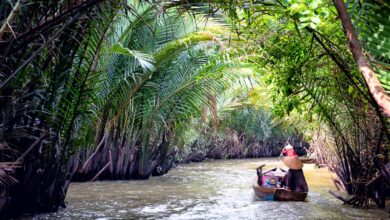A Complete Guide to Marine Conservation Trips in Belize

A typical Belize marine conservation program is designed for active engagement and meaningful impact. Programs are usually based on private islands, and volunteers both learn and lend a hand in activities organized by marine scientists and local experts.
Belize is a small country in Central America, bordered by Mexico to the north. It is known for its diverse cultures and has rich biodiversity with coastal jungles, wildlife, and the second-largest barrier reef in the world.
Many Belize marine conservation programs teach you essential scuba skills or help you qualify as an open water diver before joining the research dives. These may involve monitoring coral health, conducting biodiversity dives, eradicating invasive lionfish, and participating in plastic and debris cleanups.
Activities are often tailored to your comfort and interests, from relaxed snorkeling to focused scientific surveys. These programs go beyond just observing marine life—they empower participants to protect and restore fragile ecosystems, leaving a legacy beneath the waves.
Types of Marine Conservation Programs in Belize
There are several marine conservation programs to choose from, each with a focus on both research and community engagement. Some key activities include:
- Coral reef preservation: Help plant new coral fragments, monitor their health, and participate in nursery projects that strengthen the reef against climate challenges.
- Lionfish management: Support efforts to control invasive lionfish populations, which outcompete native species and disrupt coral ecosystems.
- Data collection: Divers identify and record marine species, gather important scientific data, and support ongoing research for global databases.
- Educational outreach: Many programs incorporate local community work, such as organizing school visits and promoting sustainable practices.
Participants leave with both in-depth knowledge of the marine world and practical conservation skills.
Life on the Islands: Accommodation and Daily Routine
Most Belize marine conservation trips are based on idyllic private cayes (small islands), offering a unique blend of work and leisure. Accommodations typically include simple but comfortable dorms or eco cabanas with daily meals provided.
- Twice-daily dives: Expect a routine of morning and afternoon dives, plus occasional night dives and training sessions.
- Leisure time activities: Kayaking, paddleboarding, and hammock lounging are common ways to unwind between conservation work.
- Community living: Meals and downtime are shared with an international team of volunteers, instructors, and local staff.
These immersive environments foster a sense of belonging and shared purpose within conservation efforts.
Requirements and How to Join
While some prior diving experience is helpful, most projects welcome beginners and offer comprehensive training, including an Open Water dive certification as part of the package. Requirements typically include:
- Adequate swimming ability and basic fitness
- Minimum age (often 16+), with parental consent for minors
- Commitment to the program’s objectives and respect for local guidelines
- English language proficiency for clear communication
Before you travel, most programs will confirm your eligibility and share packing lists that include essentials like reef-safe sunscreen and your own dive equipment.
The Lasting Impact of Marine Conservation Trips
Marine conservation trips in Belize aren’t just a vacation—they’re an investment in the future of the oceans. Travelers return home with:
- A deeper understanding of coral reef dynamics
- Hands-on experience supporting critical marine research
- Lifelong connections with conservationists and fellow ocean lovers
- Confidence and skills to advocate for marine protection in their own communities
Belize’s blend of extraordinary reefs, welcoming communities, and innovative conservation projects makes it the ultimate destination for those eager to protect our blue planet.
Key Takeaways
- Participate in activities like invasive lionfish control, coral reef preservation, and marine species data collection.
- Enjoy daily scuba dives and leisure time on private islands.
- Suitable for beginners with training and Open Water certification included.
- Gain hands-on experience and marine knowledge and contribute to protecting Belize’s ocean ecosystems.



